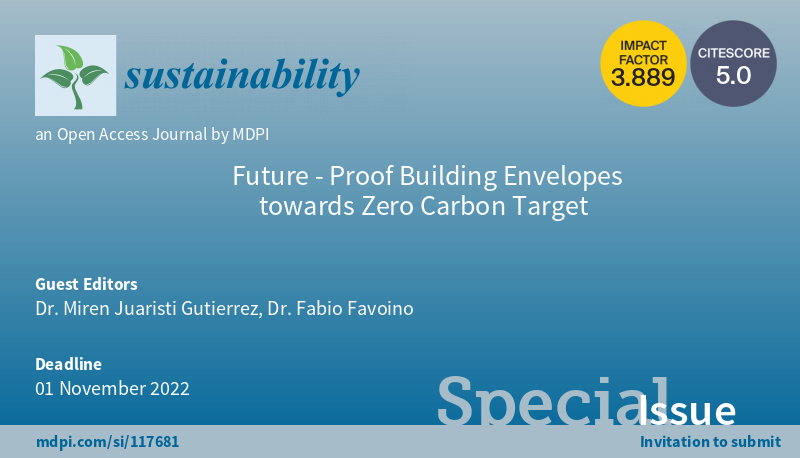Call for papers: Special issue “Future-Proof Building Envelopes towards Zero Carbon Target”

This special issue belongs to the section “Green Building“.
Deadline for manuscript submissions: 1 November 2022.
Special issue editors:
- Dr. Miren Juaristi Gutierrez (Guest Editor)
- Dr. Fabio Favoino (Guest Editor)
The building sector has a high environmental impact and therefore, in order to achieve carbon neutrality targets, this sector must face the current challenges. Research on building envelopes can contribute substantially to achieving carbon neutrality, as this building component (i) contains several types of materials; (ii) has a shorter lifetime compared to the building structure; (iii) has a strong impact on operational energy demand, indoor comfort and user wellbeing; and (iv) can enable on-site solar energy harvesting.
In the last decade, research on envelope technologies has been mainly driven by the need to optimise operational energy use and integrate renewable energy technologies, and concepts such as Nearly Zero Energy Buildings have been pursued. However, in order to reach the 2050 Climate Neutrality target, future envelopes must be developed with a more ambitious vision. Indeed, there is a growing body of literature on the impact of materials used in building envelopes, according to their sources and biodegradability/recyclability potential. Nevertheless, the achievement of this target is not limited to the right choice of materials: CO2 emissions also depend on (i) the fabrication processes (the energy required and its source, generated waste, transport distances and means); (ii) the operational energy of buildings; (iii) the durability of buildings and their components; (iv) generated waste during all processes; (v) and what happens to the envelope components when they reach their End of Life. It is imperative to promote economic investment in adequate technologies to reduce the carbon footprint; therefore, profitable business models must be developed to boost circular economy. There are emerging papers and investigators working on these topics, anticipating a change in the trends of building envelope research.
This Special Issue aims to reflect this change of thinking in the field of building envelopes with a compilation of the latest research results. Potential topics to be presented in the SI are:
- Materials, technologies and methods that promote circularity and reusability of building envelope components;
- Building envelope design with a vision of assembly and disassembly;
- Bio-based, reusable and/or recycled materials for high performance facades or roofs;
- Minimisation of fast waste from building envelope technologies in any of their life phases (fabrication, construction, maintenance or End of Life);
- Business models to drive circularity and reusable building envelope components;
- How to achieve climate neutrality in buildings by integrating appropriate building envelope technologies: a holistic environmental perspective (Life Cycle Assessment);
- Digital tools and/or processes to reduce the carbon footprint of building envelopes;
- Increasing the lifespan of building components and buildings through durable building envelope technologies, processes and design methodologies;
- Predictive maintenance of building envelopes to increase their durability;
- Materials, Technologies that promote resiliency and robustness of the building envelopes & buildings towards climate change effects;
- Design and Calculation Methods that promote resiliency and robustness of the building envelopes and buildings towards climate change effects.
Find here more details about the submission process.
